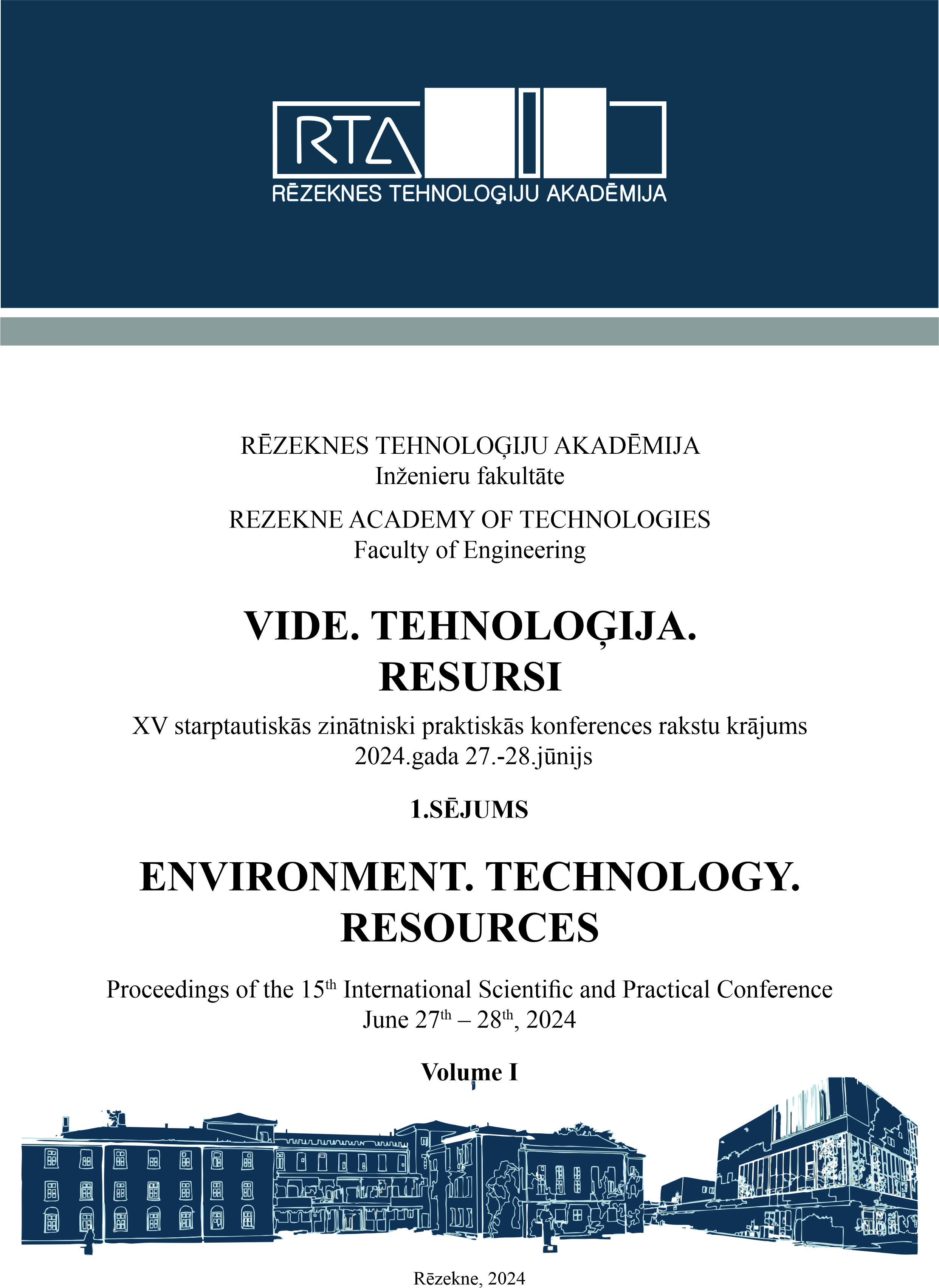ASSESSMENT OF THE SUSTAINABILITY OF WATER AND SANITATION SYSTEMS IN RURAL VILLAGES THROUGH INDICATORS. AN EXPERIENCE OF CONCEPTUAL DESIGN AND APPLIED SOFTWARE IN PERU
DOI:
https://doi.org/10.17770/etr2024vol1.8009Keywords:
assessment, rural, sanitation, sustainabilityAbstract
The main objective of the present research was to apply the sustainability approach to the management of sanitation systems carried out by community-based organizations (JASS) in rural villages with the support of the district municipality. Given the limited capacity of rural district municipalities to supervise, monitor and provide technical assistance to these community organizations, a proposal for municipal technical assistance (MTA) was developed based on an index for the evaluation of the sustainability of rural sanitation systems (IESSSR). Such index allowed to evaluate not only the sustainability, but also to identify the deficient and unsustainable aspects of each system, which was crucial to develop improvement plans for each JASS. A first measurement of the sustainability of the two intervened systems was made – of the rural population centres of Palmira and Dos de Mayo, both located in the district of Leymebamba –, a general sustainability index (IGS) for JASS Palmira of 3.010 (Stable) and for Dos de Mayo of 2.997 (Unstable) were obtained. In the second measurement, using 5 dimensions, 18 factors, 48 variables and 66 indicators, the IGS of JASS Palmira was 3.179 (Stable) and that of Dos de Mayo was 3.233 (Stable). The reliability of the index was analysed using the test-retest method by comparing the May and December measurements of each JASS, obtaining a Pearson correlation index of 0.631 for Palmira and 0.602 for Dos de Mayo. Finally, the index was developed into a software application to facilitate the storage, processing, monitoring, evaluation and presentation of the information, and is currently being tested in the municipality of Leymebamba.
References
INEI – PERÚ, “Censos nacionales 2017: XII de Población, VII de Vivienda y III de Comunidades Indígenas”. Instituto Nacional de Estadística e Informática. 2017. Recuperado en https://censos2017.inei.gob.pe/redatam/. T. Burnstein-Roda, “Reflexiones sobre la gestión de los recursos hídricos y la salud pública en el Perú”. Rev. perú. med. exp. salud publica vol.35 no.2 Lima abr./jun. 2018. DOI: http://dx.doi.org/10.17843/rpmesp.2018.352.3641
H. Fujishima, “Aplicación de un índice para la evaluación de la sustentabilidad de sistemas de saneamiento rural en Leimebamba-Amazonas”. Rev. Espacio y Desarrollo, (39), 1-27. PUCP 2022. Recuperado a partir de https://revistas.pucp.edu.pe/index.php/espacioydesarrollo/article/view/25552
S. Sepúlveda, “Biograma: metodología para estimar el nivel de desarrollo sostenible de territorios”. Sergio Sepúlveda S. San José, C.R.: IICA, 2008. 132 p. Recuperado de http://repiica.iica.int/docs/B0664e/B0664e.pdf
J. Ramírez, A. Sigarroa, and R. Del Valle, “Characterization of Cocoa (Theobroma cacao L.) Farming Systems in the Norte de Santander Department and Assessment of Their Sustainability”. Rev. Fac. Nac. Agron. Medellín 67(1):7177-7187. 2014. DOI: http://dx.doi.org/10.15446/rfnam.v67n1.42635
S. Jones and C. Silva, “A practical method to evaluate the sustainability of rural water and sanitation infrastructure systems in developing countries” DOI: https://doi.org/10.1016/j.desal.2008.05.094
L. Seghezzo, “Un índice de sustentabilidad para la evaluación integral de los sistemas de gestión del agua y el saneamiento”. Rev. Avances en Energías Renovables y Medio Ambiente, Vol. 14, 2010. Recuperado de http://sedici.unlp.edu.ar/handle/10915/9936
J. Debus, “Sustainability Index of Rural Water Services: Burkina Faso and Niger”. Global Water Initiative programme in West Africa 2008-12. august 2014. Recuperado de https://pubs.iied.org/g03983
A. Tonolli, “Propuesta metodológica para la obtención de indicadores de sustentabilidad de agroecosistemas desde un enfoque multidimensional y sistémico” Revista de la Facultad de Ciencias Agrarias. 51. 381-399. Recuperado de https://www.researchgate.net/publication/339165206_Propuesta_metodologica_para_la_obtencion_de_indicadores_de_sustentabilidad_de_agroecosistemas_desde_un_enfoque_multidimensional_y_sistemico/citation/download
COSUDE, “Acceso al agua y saneamiento. Desde la mirada de la Gestión Integrada de los Recursos Hídricos”. Agencia Suiza para el Desarrollo. 2010. Recuperado de https://www.cooperacionsuiza.pe/categoria_de_publicacion/agua-institucionales/
MVCS PERÚ, “Diagnóstico sobre el abastecimiento de agua y saneamiento en el ámbito rural – DATASS”. Ministerio de Vivienda, Construcción y Saneamiento. 2023 recuperado de https://www.gob.pe/880-diagnostico-sobre-el-abastecimiento-de-agua-y-saneamiento-en-el-ambito-rural-datass
INDECOPI PERÚ, “Base de datos de registros en dominio público”. Instituto Nacional de Defensa del Consumidor y Propiedad Intelectual. Recuperado de https://indecopi.gob.pe/web/invenciones-y-nuevas-tecnologias/base-de-datos-de-patentes
WIPO, “PATENTSCOPE, Date base of patents” World Intelectual Property Organization (2023). Recuperado de https://www.wipo.int/patentscope/en/
European Patent Office, “ESPACENET. Date Base Patent search. 2023. Recuperado de https://worldwide.espacenet.com/patent/
H. Fujishima, “Las organizaciones comunales y la gestión integral y sostenible del saneamiento rural en Leymebamba 2020. Tesis doctoral”. Universidad Nacional Toribio Rodríguez de Mendoza. 2023 recuperado en: https://repositorio.untrm.edu.pe/bitstream/handle/20.500.14077/3530/Hugo%20Ramon%20Fujishima%20Martell%20-%20EPG.pdf?sequence=3&isAllowed
Downloads
Published
Issue
Section
License
Copyright (c) 2024 Hugo Fujishima, Gina Chávez, Milagros Granda, Alondra Oviedo, Edward Rojas

This work is licensed under a Creative Commons Attribution 4.0 International License.



